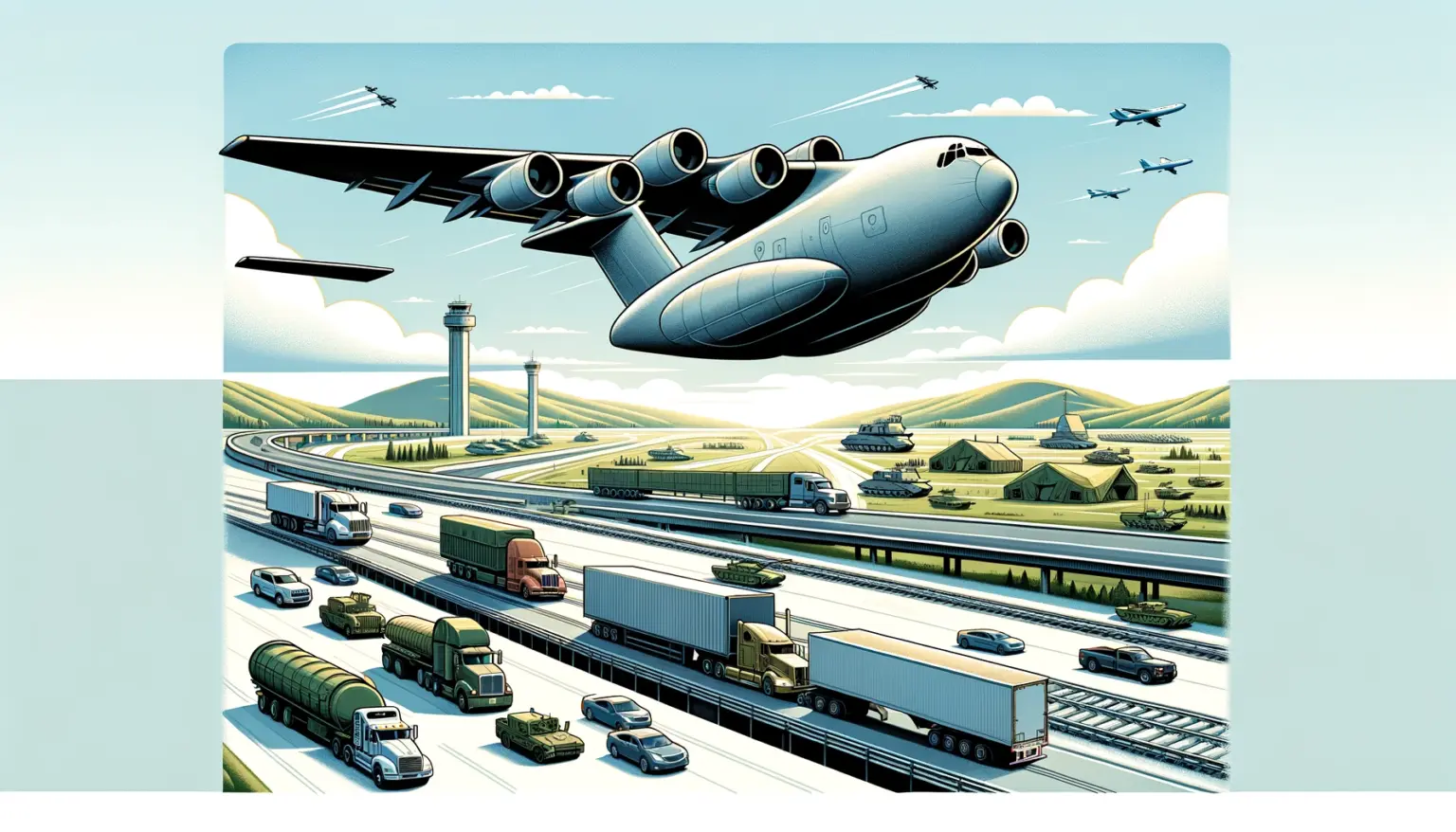National Defense Transportation Day, celebrated annually on the third Friday in May, honors the vital role transportation plays in our national defense. This day is dedicated to recognizing the contributions of both military and civilian transportation professionals who ensure the seamless movement of troops, equipment, and supplies. Their efforts are crucial for maintaining national security and supporting global military operations.
Understanding the significance of this day helps us appreciate the complexity and importance of defense logistics. The smooth functioning of transportation networks is essential for the readiness and efficiency of our armed forces. This article delves into the history, significance, and various aspects of National Defense Transportation Day, highlighting its ongoing relevance in today’s world.
History of National Defense Transportation Day: Origins and Legislation
National Defense Transportation Day was established by President Dwight D. Eisenhower in 1957, reflecting the growing recognition of transportation’s critical role in national defense. Eisenhower, having experienced the logistical challenges of World War II, understood that an efficient and reliable transportation system was indispensable for military success.
The day was formalized through a joint resolution of Congress, and Public Law 85-326 was signed into law on May 14, 1958. This legislation aimed to promote awareness and appreciation of the transportation industry’s contributions to national defense. The establishment of this day underscores the enduring importance of robust transportation infrastructure and logistics capabilities in safeguarding national security.
Importance of Transportation in National Defense: Strategic Role and Historical Examples
Transportation logistics are the backbone of military operations, enabling the swift and efficient movement of troops, equipment, and supplies. Strategic transportation ensures that military forces can be deployed rapidly and sustained over long periods, regardless of geographic challenges. This capability is crucial for maintaining operational readiness and responding to emerging threats.
Historical examples abound where transportation played a pivotal role in military success. During the D-Day landings of World War II, the coordination and execution of massive troop and equipment movements were critical to the Allied victory. Similarly, the Berlin Airlift demonstrated the power of air transportation logistics in sustaining a besieged city. In modern times, advancements in transportation technology, such as unmanned aerial vehicles (UAVs) and sophisticated logistics software, continue to enhance our defense capabilities.
Celebrations and Activities: National Observance and Local Events
National Defense Transportation Day is celebrated with a variety of events and activities across the United States. National observances often include ceremonies and speeches by government and military officials, highlighting the importance of transportation in national security. These events serve to honor the dedication and service of transportation professionals in both the public and private sectors.
Local communities and military bases organize parades, open houses, and educational exhibits to engage the public and raise awareness about the critical role of transportation in defense. Schools and universities participate by hosting educational programs and activities that teach students about the history and significance of defense transportation. These celebrations provide an opportunity for people of all ages to learn about and appreciate the efforts of those who ensure the safety and security of our nation.
The Role of Professionals in Defense Transportation: Military and Civilian Contributions
Defense transportation relies on the coordinated efforts of both military and civilian professionals. Military logistics and transport personnel are responsible for planning and executing the movement of troops and equipment, often under challenging conditions. Their expertise in managing complex supply chains and ensuring timely deliveries is crucial for operational success.
Civilian transportation professionals, including truck drivers, pilots, and logistics planners, play an equally important role. They provide the infrastructure and support needed to maintain the flow of goods and services essential for defense operations. Recognizing and honoring these individuals’ contributions is a central aspect of National Defense Transportation Day. Various awards and honors are bestowed upon those who demonstrate outstanding service and dedication to defense transportation.
Challenges and Future of Defense Transportation: Current Issues and Future Trends
Defense transportation faces several challenges, including cybersecurity threats, supply chain vulnerabilities, and infrastructure maintenance. Ensuring the security of transportation networks against cyber attacks is a growing concern, as these systems become increasingly digitized and interconnected. Additionally, maintaining and upgrading aging infrastructure is essential to support the efficient movement of military assets.
Looking to the future, advancements in artificial intelligence (AI), automation, and sustainable practices are set to revolutionize defense transportation. AI and machine learning can optimize logistics planning and decision-making processes, while automation promises to enhance the efficiency and safety of transport operations. Sustainable practices, such as the use of alternative fuels and energy-efficient vehicles, are becoming increasingly important in reducing the environmental impact of defense activities.
How to Get Involved: Public Participation and Educational Resources
There are many ways for the public to get involved in National Defense Transportation Day. Participating in local events, volunteering with organizations that support defense transportation, and engaging in educational activities are just a few examples. By taking part in these activities, individuals can show their support and appreciation for the professionals who play a critical role in national defense.
Educational resources, such as books, documentaries, and websites, offer further opportunities for learning about defense transportation. Schools and libraries often organize special programs and displays to highlight the importance of transportation in national security. By educating themselves and others, individuals can contribute to a greater understanding and recognition of the vital role transportation plays in our nation’s defense.
Conclusion: Reflecting on the Significance of National Defense Transportation Day
National Defense Transportation Day is a time to honor and appreciate the crucial role transportation professionals play in ensuring our nation’s security. From the historical achievements that have shaped modern military logistics to the ongoing efforts of dedicated individuals, transportation remains a cornerstone of national defense.
As we celebrate this day, it is important to reflect on the challenges and opportunities that lie ahead. By staying informed and involved, we can support the continued advancement and success of defense transportation. Let us take this opportunity to recognize the contributions of those who work tirelessly to keep our nation safe and secure.
10 Interesting Facts
- Established by President Eisenhower: National Defense Transportation Day was proclaimed by President Dwight D. Eisenhower in 1957 to recognize the importance of transportation in national defense.
- Celebrated in May: It is observed annually on the third Friday in May, coinciding with National Transportation Week.
- Legislative Roots: The day was formalized through Public Law 85-326, signed into law on May 14, 1958.
- D-Day Example: The successful D-Day landings during World War II are a prime example of effective military transportation logistics.
- Berlin Airlift: The Berlin Airlift of 1948-1949 showcased the power of air transportation in supplying a city under siege.
- Modern Tech: Advances in technology, such as UAVs and logistics software, are transforming defense transportation.
- Military and Civilian Roles: Both military personnel and civilian professionals play crucial roles in defense transportation logistics.
- Educational Programs: Schools and universities participate in National Defense Transportation Day with special educational programs and activities.
- Public Engagement: Communities across the U.S. celebrate with parades, open houses, and exhibitions to raise public awareness.
- Future Trends: The future of defense transportation includes AI, automation, and sustainable practices to enhance efficiency and reduce environmental impact.












A wonderful tribute to transportation heroes on National Defense Transportation Day!
Transportation day tribute
Important tribute!
Honoring transportation heroes on National Defense Transportation Day is very important. This article does a fantastic job of highlighting their contributions.
National Defense Transportation Day is a significant tribute. This article captures the importance of honoring our transportation heroes well. Well written!
The page about National Defense Transportation Day is very informative and engaging. It offers a detailed look at the importance and significance of transportation in national defense, along with some interesting facts and ways to honor transportation heroes. The information is well-organized and easy to read, making it a pleasure to navigate. This site is a fantastic resource for anyone wanting to learn more about National Defense Transportation Day.
The National Defense Transportation Day page is very informative and respectful. It highlights the crucial role of transportation in national defense, with compelling stories and facts. The content is well-organized and easy to read, making it a valuable resource for learning more about this important day.